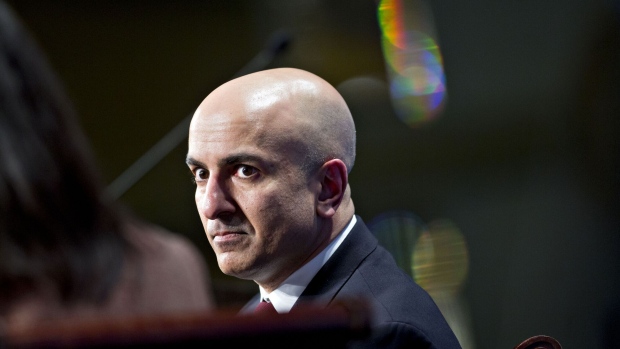May 22, 2023
Fed’s Kashkari Says a June Rate Pause or Hike Is a ‘Close Call’
, Bloomberg News

(Bloomberg) -- Federal Reserve Bank of Minneapolis President Neel Kashkari said it’s a “close call” for him if the central bank should raise interest rates next month or pause while it monitors the outlook for inflation.
“I think right now it’s a close call, either way, versus raising another time in June or skipping. What’s important to me is not signaling that we’re done,” Kashkari said Monday in an interview on CNBC.
“If we were to skip in June that does not mean we’re done with our tightening cycle, it means to me we’re getting more information. Do we then start raising again in July, potentially?” he said.
Policymakers raised rates aggressively over the past 14 months, bringing their benchmark interest rate to a range of 5% to 5.25% from near zero. They’ve slowed down this year, delivering three consecutive quarter-point hikes after raising at a faster clip for much of 2022, and some officials have signaled support for a pause at their June 13-14 meeting.
Turmoil in the banking sector following the failure of several institutions this spring has amplified a pullback in lending that started last year. Policymakers have said they’d like to carefully assess how that and the rapid rate increases are working through the economy.
Kashkari said that bank stress that tightens credit conditions could help to cool price pressures and do the Fed’s work for it. But he’s not seeing evidence of that yet. Service-sector prices, in particular, have proven sticky and still out of balance, he said.
While Fed Chair Jerome Powell and other officials have expressed support for a pause at the June meeting — Powell said Friday the central bank could “afford” to take time to look at the impact of their tightening so far — a small contingency of policymakers has said persistent inflation means continued rate increases may be necessary.
Many have emphasized that a pause in June would likely not mark the end of the rate hike cycle, framing it instead as a “skip.”
“Since the seven or eight years I’ve been on the committee, this is the most uncertain time we’ve had in terms of understanding underlying inflationary dynamics, so I’m having to let inflation guide me,” Kashkari said.
“It may be that we need to go north of 6%, let’s see what happens in the underlying services economy,” he said. “But if the banking stresses start to bring inflation down for us, then maybe we’re getting closer to being done. I just don’t know right now.”
(Updates with more Kashkari comment in final paragraph.)
©2023 Bloomberg L.P.





